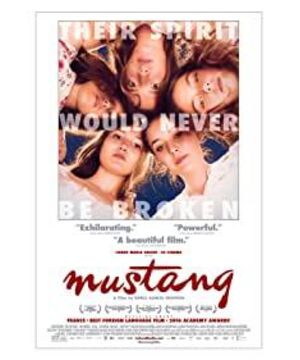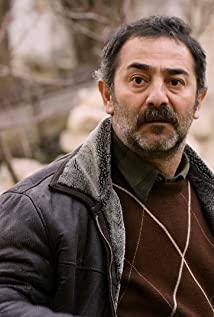Such a film debut that speaks 100% Turkish and takes place in Turkey, but defeated other excellent films including Palme d’Or and represented the largest country in art film (France) for the Oscar for Best Foreign Language Film. "Wild Horse" double victory in word of mouth and box office, enough to reflect from all aspects of today's European art film from industry to ideology to aesthetics.
As the last seemingly absurd result implies, in today's economy and culture are accelerating into global integration. Organizing film competitions by country is obviously outdated. But if it has to be done, "Wild Horse" should indeed be regarded as a French rather than a Turkish film in every respect.
Although the director of the film, Ai Gewen, is a Turk, he has lived in Western Europe for a long time, speaks fluent French, and graduated from the French film industry's main creator-the National Higher Image and Sound Vocational School (LA FEMIS)-the best in France Elite Film Academy. Therefore, like most Western European art films, the film started from financing and production, and applied for film support funds from various countries under the operation of French producers. Finally, it was produced by French companies in Germany, Turkey, and Qatar. Entered the film festival and the market under the background of the joint production of the companies. In the long production list of "Mustang", we can easily find that in addition to the Turkish Ministry of Culture, the most well-known official film funds in Europe such as Eurimages (EU), CNC (France), FFA (Germany), and Canal+, ZDF Arte is like a magnate in the French and German media industry.
Returning to the movie itself, "Wild Horse" is first of all an author's film full of humanistic care. Like most film authors who are immersed in the French cultural and educational background, Tinnis Aigwin’s debut work begins with a reflection on social reality (the first pass of the FEMIS entrance exam is a two-month social survey); Like most female directors, it is the fate of "women" in this society that first entered their vision and haunted their entire career.
At the beginning of the film, it straightforwardly explained the "scandal" that caused all drama conflicts: on the day at the end of the semester, the five sisters, who were young and beautiful but whose parents had died early, played ambiguously with boys on the Black Sea, which triggered the conservativeness in the village. The rumors of the villagers. This sudden incident deprived them of the freedom to choose the future. The authoritarian family under the control of their uncle soon evolved into a "prison" in which the five sisters were imprisoned. They would be "disassembled" and "selected" in the most traditional way. And "be" married into another strange family. When the new semester begins again, the five sisters will never be reunited again, and their different endings also collage a group portrait of the fate of contemporary Turkish women.
As early as the eighteenth century, Oriental sentiments have been rampant in France. The first European translation of "One Thousand and One Nights" was completed by the French. Montesquieu wrote the "Persian" letter; and Droclow and Ingres used oil paintings to illustrate the other to the public. A world. Many people attribute the success of "Wild Horse" to such an exotic political continuation, which on the surface shows the tolerance and curiosity of the French nation, but in essence it inherits the West and the East, civilization and barbarism. Outdated distinctions, and consolidated and even catered to Western society's stereotyped imagination of the backward and ignorant of the Eastern world. It is true that this criticism is not unreasonable. But it is not enough to eliminate the seriousness of the Turkish women's issues that "Wild Horse" focuses on: If you have a deep understanding of the national conditions of Turkey, it may be inappropriate to question the favor of Western audiences in this moment. In fact, the female tragedies caused by imprisoned girls, comprador marriages, sexual assaults in the family, and virgin complexes involved in the film are not only real, but Turkish women are murdered or even commit suicide due to the same incident every day. Just in February of this year, the rape and murder of Turkish female university student Aslan triggered a nationwide demonstration and protest in Turkey, further highlighting this Muslim country that once strode secularized under Kemal to complete the miracle of modern state construction. On a realistic level, how is still struggling in the tension between secular and religious, and how the patriarchal social structure and psychology bred by Islamic culture deeply dominate the lives of ordinary people in Turkey.
Because of this, Istanbul in the movie, the secular metropolis bordering the Western world, once again plays the utopia in the hearts of Turkish country folks who are eager for the universal value of the West. Where women can be the same as men to shout for Galatasaray’s UEFA Champions League journey (the director in the film even arranged a football match where only female fans can watch the game), there can be no hijab, high heels and the most entertaining The clothing of the time is also the only way out for the youngest sister Lale. It is the world where Lale’s teacher lives, the only independent adult woman in the film. The director apparently set the little sister of this little ghost as a symbol of hope in a conventional manner. She is the only woman among the five sisters who is conscious of her own destiny, and she is planning her own "resistance movement" in a planned way. Therefore, the film ostensibly tells the elder sisters who were forced to marry in a step-by-step manner, but the real narrative clues are closely linked to the great escape from Istanbul at the end of the film.
This very conflict-rich drama structure also implicitly reveals the ambiguous film outlook of a new generation of "French" creators. Obviously, Hollywood's erosion is everywhere, just as Odia, the Cannes Palme d'Or winner this year, has been committed to instilling humanity in genre films. If critics take the inertia of the "author's film" away from "Mustang", the director of the film will no longer be satisfied with the film shackled in a traditional naturalism, no matter from the structure of the play or the style of the image. In the style of social realism (such as the Darnet Brothers, this year’s Cannes’s Best Actor Film "The Law of the Market"). In other words, "Wild Horse" is not only a social critical function, it is also tense, beautiful, and hopeful.
The director's pursuit of audiovisual "beauty" first revealed that her expectations for the film itself are beyond reality. There is no doubt that if the naturalistic aesthetics are required, the film’s photography and soundtrack are "too" sophisticated. The title of the movie "Wild Horse" not only hints at the girls who are trying to break free from the shackles of fate, but also because the director expects the film's images to present a unique aesthetic atmosphere, just like wild horses flying in the wind on the prairie. Mane. Although the main body of the film is five young girls who are deeply locked in boudoirs, their adolescent bodies are shining in a trickle of flowing light and shadow, and their hair is really like a free flowing mane in the wind. Mao, beautiful and innocent. Here, we can even find the most paradoxical part of the film. It started with a theme of asceticism that closely followed social reality, but it rushed towards a romantic ending under the scenes of "erotic". On the one hand, it aims to Paying attention to the situation of women in the shadow of patriarchy, on the other hand, they cannot escape the question of consuming adolescent girls' bodies. Perhaps we can argue that the director is to use the healthiest and most beautiful carcass, with the purest gaze to fight against the conservative and closed "cannibalism" moral and religious laws. But this kind of sway between two extreme incompatible movie views can still allow us to list a series of unnatural aspects of the film.
Just as the social reality that a feature film with undulating plot lines can accommodate is necessarily distorted to a certain extent. In the 100-minute "Wild Horse", the director tried to pack too much baggage. Even if we do not investigate whether the conflict at the beginning of the film is enough to cause such a humanitarian disaster for the girls, we will put aside how realistic and typical the girls’ extreme family environments are; it is just an attempt to penetrate Turkey in the story of the five sisters. The various unfortunate experiences that women suffer most often appear to be a bit cramped and far-fetched. In particular, the portrayal of inconsistent relationships within the family and the design of teenage suicides in the film appear to be insufficiently laid out and too thin. As for the sisters' cruising and adventure around the family prison and the final battle that resembles the "Straw Dog" style, please let the audience walk out of the cinema with a carefree mood like enjoying a Hollywood-style happy ending!
"Deep Focus" (Deep Focus) is a Chinese fan movie manual established in Paris but with members distributed all over the world, providing the latest film information and criticism in Europe and North America. At the same time, we are also in-depth observers of the world's major film festivals and the film industry. Whether you are a critic with unique insights, a translator who is proficient in foreign languages, or a public relations expert who promotes and maintains the platform: "Deep Focus" welcomes you to join us to create the best light and shadow text. We will also wholeheartedly recommend your labor results to the Chinese-language media! For further communication, please leave a message directly on this WeChat official account (deep_focus).
View more about Mustang reviews











